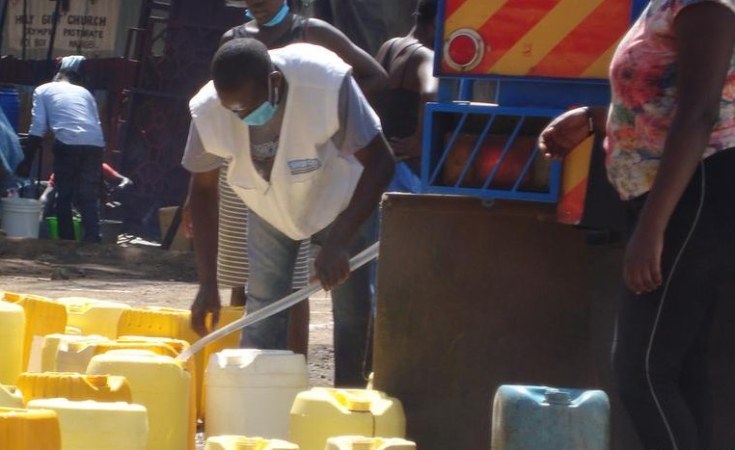Women and girls in Kenya's Kibera slum, the largest in Africa, are often forced to trade sex for water. The government says it now wants to tackle the problem which is also prevalent in many rural communities.
Caroline Munyoki (Editor's note: name changed to protect their identity) lives in Kenya's infamous Kibera slums in the capital Nairobi.
Recently, her 16-year-old daughter was sexually exploited by several men in her neighborhood when she was looking for potable drinking water.
Kibera slum, the largest in Africa, is one of Kenya's informal settlements riddled by constant water scarcity.
"I have lived here in the Kibera slums for more than 10 years, water is our biggest problem, we have no piped water. There are so many water brokers who are part of our problems also," Munyoki told DW.
Parents like Munyoki send their children, especially girls, to search for water. "We normally send our young girls to fetch water from the vendors who in turn take advantage of them."
Afraid to share the personal ordeal of her daughter, the mother of two said the perpetrators warned her not to talk.
Instances of sextortion
The offenders threatened Munyoki that they would release the video of her daughter being sexually exploited, hoping to coerce her into silence.
"Most of our children are lured into sex for water, the offenders then take photos and videos of these acts," she explained, adding that the victims are often forced to continue engaging in sexual activities after being warned that if they didn't agree to it, the sexual predators would share the videos on social media.
According to Munyoki, some of the sexual assaults take place close to home. "Some of it even happens at our community toilets. This form of exploitation is very common and our girls don't know what they are getting themselves into."
Water.org, a global nonprofit organization working to bring water and sanitation to the world, says that out of Kenya's population of 53 million people, 15% rely on questionable water sources, including ponds, shallow wells, and rivers.
Some 41% of Kenyans also need access to basic sanitation solutions. These challenges are especially evident in rural areas and urban slums where people are often cannot connect to piped water infrastructure.
In rural Kenya for instance, the average total cost for an unreliable or distant water supply is approximately $38 (€35) per month, the group said.
Provisions in Kenya's constitution actually guarantee the right to access safe water and reasonable sanitation standards. In slums like Kibera though, that's far from reality.
Ending the abuse
The Kenya Water and Sanitation Civil Society Network (Kewasnet) said that women no longer feel safe fetching water away from their homes and the civil society organization has now launched a campaign to end this abuse.
Vincent Ouma, the head of programs at Kewasnet, told DW that the number of women affected by this abuse could be higher than previously thought as many victims were suffering in silence.
"We have done studies in the informal settlements and what we found out is that sextortion happens to at least 9% of the girls, and this is proven by studies that we have done, so it is actually a problem," Ouma said.
Kewasnet said it was also concerned by the culture of silence in the low-income settlements.
"As a community, as a society, we have been silent about it, because of the shame, the guilt, that comes with it, so we don't talk about it, we don't admit that it is a problem, but it is a problem."
Government officials have also confirmed this worrying trend.
Beatrice Inyangala, the Principal Secretary for Higher Education and Research, told DW that the problem was very prevalent among poor communities.
"There is an angle to water that is often missed out because in the villages when the young girls go to collect water from the streams, they meet young men and then they get extorted for sex," Inyangala said.
"This research has also found out that sextortion exists in slums whereby young girls sometimes have to lose their dignity so as to get the water, something that is a basic human right."
The government has reaffirmed its commitment to end sex-for-water but faces the daunting task of ensuring safer access to clean water in deprived communities.
Edited by: Chrispin Mwakideu


